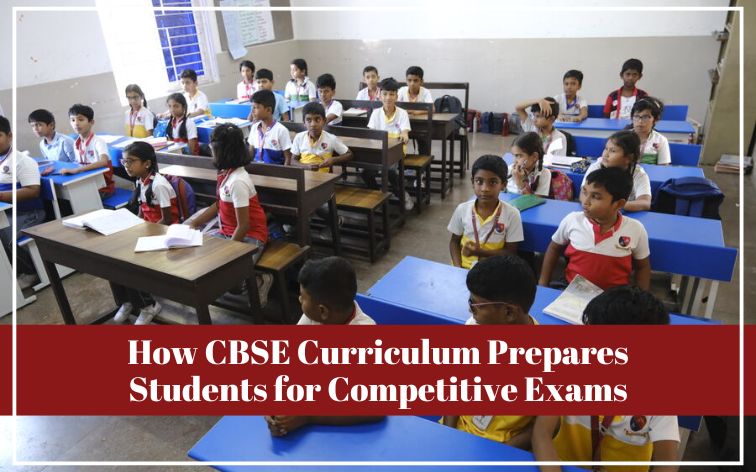In India, competitive examinations play a crucial role in shaping students’ academic and professional journeys. To succeed, students must begin developing the right knowledge base and skills from their school years. The CBSE curriculum is designed with this in mind, offering comprehensive syllabus coverage, strong conceptual clarity, consistent assessments, and structured feedback mechanisms. These features not only strengthen academic foundations but also equip students with the confidence and strategies needed to excel in exams like JEE, NEET, UPSC, and beyond. In this article, we explore ten ways in which the CBSE curriculum prepares students for competitive exams.
Mahalakshmi Vidya Mandir CBSE stands as the top choice among CBSE schools in Chennai, providing students with the perfect environment, guidance, and resources to excel in competitive examinations and build future-ready skills.
1. Comprehensive Syllabus Coverage
The CBSE curriculum offers a wide-ranging syllabus that covers all essential topics in depth, ensuring students gain a strong foundation across subjects. This comprehensive approach helps students identify key concepts that frequently appear in competitive exams. By systematically covering the syllabus, students develop confidence in handling diverse questions. The structured coverage also reduces knowledge gaps, making it easier to tackle challenging problems in exams like JEE, NEET, or Olympiads. Additionally, the curriculum’s breadth ensures that students are well-prepared for both objective and subjective question formats.
2. Emphasis on Conceptual Understanding
CBSE focuses on conceptual clarity rather than rote learning, which is critical for competitive exams that test analytical abilities. Students are trained to understand the “why” behind every concept, enabling them to solve application-based questions efficiently. This concept-oriented learning enhances problem-solving speed and accuracy, particularly in exams like JEE, NEET, and other engineering or medical entrance tests. Moreover, a strong conceptual base allows students to adapt quickly to unfamiliar or tricky questions. Ultimately, this emphasis builds long-term retention and deep understanding, key to excelling in competitive assessments.
3. Regular Assessment and Feedback
The CBSE system includes frequent assessments and continuous feedback, which helps students monitor their progress and identify areas of improvement. These regular evaluations simulate the pressure of competitive exams, allowing students to manage time and stress effectively. Feedback from teachers provides personalized guidance, helping students focus on weaker areas before they become major obstacles. Additionally, ongoing assessments encourage consistent study habits, reducing last-minute cramming. This approach prepares students to face competitive exams with confidence and strategic problem-solving skills.
4. Skill Development (Critical Thinking, Problem Solving)
CBSE actively promotes critical thinking and problem-solving skills, which are indispensable for competitive exams. Students are encouraged to analyze, evaluate, and apply concepts in diverse scenarios rather than memorize answers. This nurtures logical reasoning and decision-making abilities, which are tested in almost every entrance exam. By integrating real-life examples and higher-order thinking questions into the curriculum, students develop the ability to tackle complex problems efficiently. These skills give CBSE students a competitive edge, as most exams now require more than mere factual knowledge.
5. Standardized and Updated Curriculum
The CBSE curriculum is standardized and regularly updated, ensuring students study content aligned with the latest competitive exam patterns. This reduces the gap between school learning and entrance exam requirements. Updated syllabi include modern teaching methods, new problem types, and current scientific developments, helping students remain exam-ready. A standardized approach also allows students to benchmark themselves against peers nationally, simulating the competitive environment. Consequently, CBSE students are better prepared to face national-level entrance exams with confidence and accuracy.
6. Integration of NCERT Textbooks
CBSE’s integration of NCERT textbooks provides a reliable and structured knowledge base for competitive exams. Most entrance exams, especially NEET and JEE, directly reference NCERT concepts, making thorough familiarity crucial. NCERT books focus on clear explanations, diagrams, and solved examples, which strengthen conceptual understanding. Students who study these textbooks can practice application-oriented questions and retain core concepts for exams. NCERT effectively impacts students, which ensures CBSE students have a solid foundation to tackle high-difficulty questions with ease.
7. Alignment with Major Competitive Exams
The CBSE curriculum is strategically designed to be aligned with major competitive exams like JEE, NEET, Olympiads, and foundation tests. This alignment helps students prioritize topics that matter most for their exam goals. Teachers often highlight key chapters and problem types during lessons, providing focused preparation. Students develop familiarity with exam patterns and question formats, reducing surprises on the actual test day. The alignment ensures that the school learning journey is directly beneficial for future competitive challenges.
8. Practice with Mock Tests and Sample Papers
CBSE encourages students to practice with mock tests and sample papers, which is critical for competitive exam readiness. Regular practice helps students understand time management, question patterns, and difficulty levels. Mock tests provide a platform for students to self-assess and refine their strategies, enhancing speed and accuracy. Exposure to sample questions reduces exam anxiety and boosts confidence. This practical experience with simulated tests ensures students are well-prepared for high-stakes competitive examinations.
9. Focus on Core Subjects for Entrance Exams
CBSE emphasizes core subjects like Mathematics, Science, and English, which form the backbone of most competitive exams. Deep understanding in these subjects allows students to solve complex, multi-step problems efficiently. Regular practice and mastery of core subjects enhance analytical skills and problem-solving speed, crucial for exams like JEE and NEET. Teachers often integrate application-based questions to bridge school learning with entrance exam requirements. This focus ensures CBSE students are academically robust and exam-ready.
10. Development of Analytical and Life Skills
CBSE goes beyond academics to develop analytical thinking and life skills, which are increasingly valued in competitive exams. Students learn time management, decision-making, and strategic problem-solving, which help them approach tests methodically. Life skills like stress management, teamwork, and adaptability prepare students for high-pressure exam environments. Analytical skills also enable students to interpret questions accurately and identify solutions quickly. Together, these competencies ensure that CBSE students are well-rounded, confident, and ready to excel in competitive exams.
Mahalakshmi Vidya Mandir CBSE: Best CBSE School in Chennai & Trichy!
Mahalakshmi Vidya Mandir CBSE is recognized as one of the best CBSE schools in Trichy and Chennai, offering top-quality education through innovative and effective teaching methods. With a comprehensive CBSE curriculum, smart classrooms, and advanced infrastructure, we focus on both academic excellence and holistic development. Unlike other CBSE schools in the region, Mahalakshmi Vidya Mandir emphasizes nurturing well-rounded individuals who excel in every aspect of life, making us a trusted choice for parents seeking the highest standards of education.




